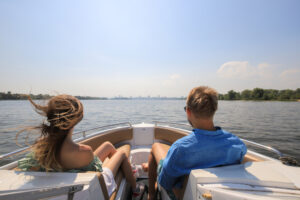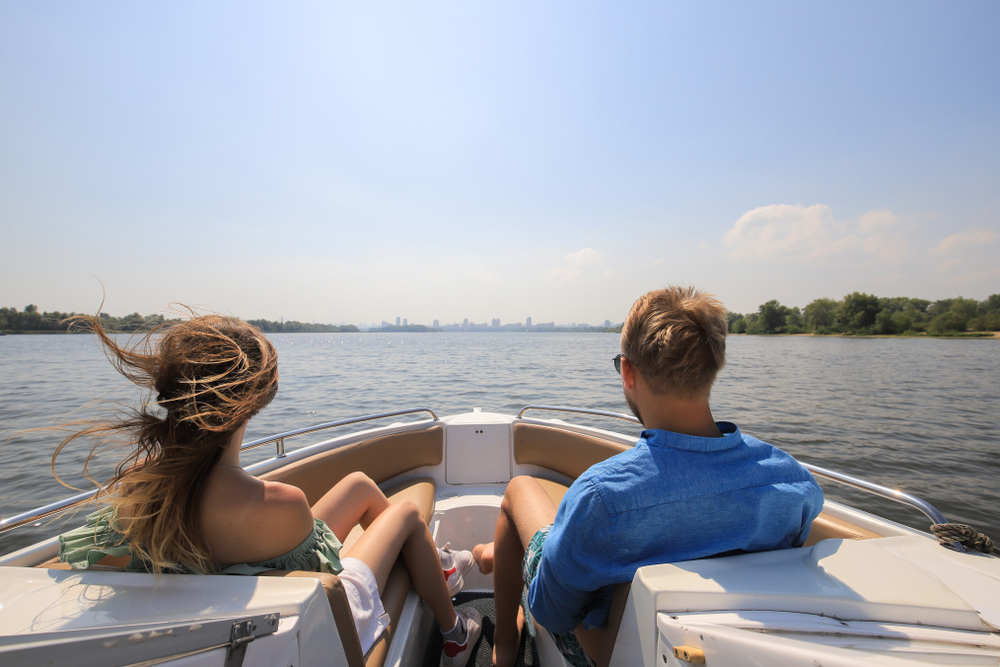 With 1,150 miles of shoreline and one of the largest man-made lakes in the Midwest, you might be surprised to learn that the Lake of the Ozarks is ranked as one of the most dangerous lakes in America, according to recent boating accident statistics kept by the U.S. Coast Guard.
With 1,150 miles of shoreline and one of the largest man-made lakes in the Midwest, you might be surprised to learn that the Lake of the Ozarks is ranked as one of the most dangerous lakes in America, according to recent boating accident statistics kept by the U.S. Coast Guard.
This poor ranking may not be too surprising for many that frequent the Lake of the Ozarks, this is particularly true for people who go to the Lake of the Ozarks on summer weekends. It seems like every year, the boat traffic increases, especially on the main channel. With more traffic comes the potential for more boating accidents. This is especially true when you factor in that a large percentage of boaters are inexperienced and operating rental boats.
Another significant risk is that the Lake of the Ozarks attracts a large number of large boats that are built for speeds. With no speed limits or horsepower restrictions, these bigger boats consistently pose a threat to smaller boats and contribute to making the Lake of the Ozarks a more dangerous place.
Below are some other factors that contribute to a higher probability of boating accidents on the Lake of the Ozarks.
Excessive Speed: On the main channel of the lake, it is not at all uncommon to see boats moving at very high speeds. The problem is exacerbated by the fact that there are many areas where there is no speed limit. Obviously, a boat driver going at a high rate of speed is going to have less time to react to an unexpected hazard such as a water-skier, tuber, jet ski-rider, or person swimming or fishing off the boat. High speeds also create more chance of boats colliding with one another, debris, or other objects that are difficult to see when the sun sets.
Alcohol: Drinking while driving a boat is the number one risk for a boating accident at the Lake of the Ozarks. Known for its party coves, lakeside bars, and clubs, the Lake of the Ozarks can get wild, especially later in the afternoon or early evening on a summer day.
Although there are drunk driving laws in place that govern those who drive boats, boaters don’t realize the effects that even small quantities of alcohol can make when boaters are in the hot sun for extended hours on the water.
Because enforcement of alcohol laws by the water patrol is difficult, boaters at the Lake of the Ozarks feel they can take liberties as it pertains to the consumption of alcohol. Many people also feel that there are simply not enough water patrol officers at the Lake of the Ozarks to enforce the law properly.
Operator Inattention: Because boating does not have as clearly defined “rules of the road,” boaters, including passengers, must always keep a careful lookout for other boat traffic and obstacles in the water, such as rocks, swimmers, submerged trees, and floating debris. The operator or driver has a duty to drive safely when a passenger in his or her boat is in the water.
Frequently, driver distractions are playing an increasing role in many boating accidents. Operating a boat can require a lot of multi-tasking, and adding distractions like wind, glare, blind spots, and fatigue, it can be easy not to see or recognize threats.
Cell phones have also added a new degree of distraction, and many boaters don’t realize the dangers of taking their eyes off their surroundings to glance down to grab or manipulate a cell phone. The problem becomes even worse when boaters use their cell phones to take photos or videos.
Almost all states have laws against using a cell phone while driving a motor vehicle. Unfortunately, Missouri is one of only two states that does not prohibit cell phone use for all drivers.
Boating After Dark: The Missouri Highway Patrol, who operates the Missouri Water Patrol, recognizes the inherent dangers of night boating, as they enforce a 30 MPH speed limit on the Lake of the Ozarks. But speed is far from the only factor that impacts the dangers of night boating. Many boaters do not have the correct equipment and lighting for nighttime driving, which, regardless of speed, has been a contributor to boating accidents on the lake. Additionally, the Ozarks are filled with coves, private docks, and shoreline obstacles that present hazards.
Boater Inexperience: We touched on this earlier, but the Lake of the Ozarks is full of inexperienced boaters. As a leisure and vacation hotspot, many people want to and can get out on the water without a boating license. Because of this, the main channel proves to be a risky and challenging place to operate a vessel, as inexperienced boaters may not understand rules and norms related to the right of way, passing, or docking.
Even more, many inexperienced boaters view boating as being very similar to driving a car. Inexperienced boaters may not know how to stop a boat, pivot, or even keep the boat in an idle position. When boater inexperience is combined with the other risk factors discussed above, it creates a perfect storm and a new universe of risk.
Case Study
Recently, a 42-year-old woman was killed, and three minors were injured in a boating accident. The accident occurred just after midnight and was caused by an intoxicated boater who was exceeding 30 MPH. This is just one of the many horrible and tragic accidents that have occurred at the Ozarks in the past few years, and only one of forty-one other boating accidents already counted this year.
To put an end to the tragedies, the collisions, and the injuries, boaters need to be more alert, cautious, and courteous to others on the lake. While the Ozarks has long been a place for fun and relaxing days on the boat, it will take a change in the driving culture to keep it that way.





